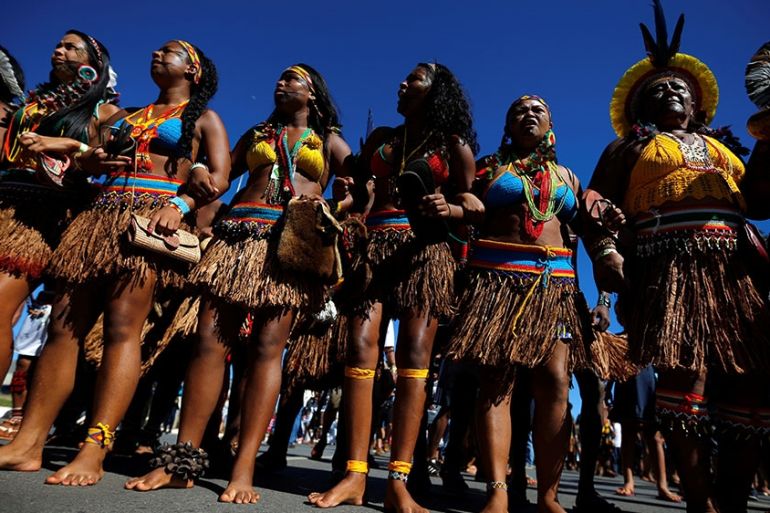Indigenous groups in Brazil march for land rights
Members of more than 300 indigenous groups protest against the right-wing government of Jair Bolsonaro.

Brasilia, Brazil – Thousands of indigenous people marched in the Brazilian capital of Brasilia on Friday to protest against the administration of far-right President Jair Bolsonaro.
More than 2,000 people occupied the city’s main avenue, stopping traffic for more than three hours. Holding banners and arrows, burning sage and painting their faces red and black, the crowd marched to the Ministry of Health and the Ministry of Justice to demand more land rights and access to public services.
Keep reading
list of 4 itemsWhy are protests against France raging in New Caledonia?
‘No choice’: India’s Manipuris cannot go back a year after fleeing violence
Photos: Indigenous people in Brazil march to demand land recognition
Sonia Guajajara, coordinator of the Articulation of the Indigenous People of Brazil (APIB) held a Brazilian flag stained with red paint. She told Al Jazeera it represented “the blood of the Brazilian people, marked by the genocide of the indigenous peoples.”
A group of indigenous people led the march with a banner that read “not one more drop of indigenous blood”.
The group protested against Bolsonaro’s decision to eliminate the Special Secretary for Indigenous Health (SESAI) that previously oversaw the healthcare issues for indigenous groups. Local councils are now responsible for providing healthcare access to the native communities. Guajajara called the decision “shameful” and “just another example of Bolsonaro’s attacks”.
![Guajajara holds a Brazilian national flag stained in red [Mia Alberti/Al Jazeera]](/wp-content/uploads/2019/04/234ea3e95cd1450ca14c54aaba8b0f2b_18.jpeg)
Outside the Ministry of Justice, protesters demanded the reversal of the Provisional Measure 870, which dismantled the National Foundation for the Indigenous (FUNAI), the government body previously responsible for protecting native groups. Under the measure, some of FUNAI’s responsibilities were moved to the Ministry of Agriculture and the Human Rights Office.
The crowd was met by police officers, who had blocked off the building’s entrance. Dozens of demonstrators jumped into the lake around the building, dancing and chanting with their children and elderly.
Inside, a delegation met with the chief of staff for the minister to demand FUNAI to be reinstated in full by the cabinet.
Marcos Xukuru, chief of the Xukuru people from the state of Pernambuco, told reporters after the meeting the ministry was open to “talk” and to schedule a meeting with “the indigenous organizations of Brazil … as soon as [officials] receive the document with all our demands”.
He later told Al Jazeera that his people were in Brasilia to “protest against the random and dangerous indigenous policies” of Bolsonaro’s government.
“They are taking our medicine, health coverage, health workers, and it was FUNAI that helped us with this,” said Manuel Atukim, from the Atukim people in Pernambuco state.
“FUNAI is ours, we can’t let it die,” he told Al Jazeera.
The march was part of an annual three-day Free Land Camp, which started on Wednesday.
Since the election of Bolsonaro last year, indigenous groups have documented an increase in the number of land grabs and violent attacks.
![An indigenous woman stands in the fountain area of a government building during a protest march to defend indigenous land and rights in Brasilia [Carl de Souza/AFP]](/wp-content/uploads/2019/04/fc36ff332be64fa2aecdd5ebdfdd39ec_18.jpeg)
The president’s office did not respond to Al Jazeera’s request for comment regarding allegations by the indigenous that his government is “attacking” their rights.
Atukim said he is hopeful the government will hear their demands. “We are not going to let our culture, that comes from our ancestors, to be taken from someone who does not belong to us,” he said. “We are going to fight until the end of our lives.”